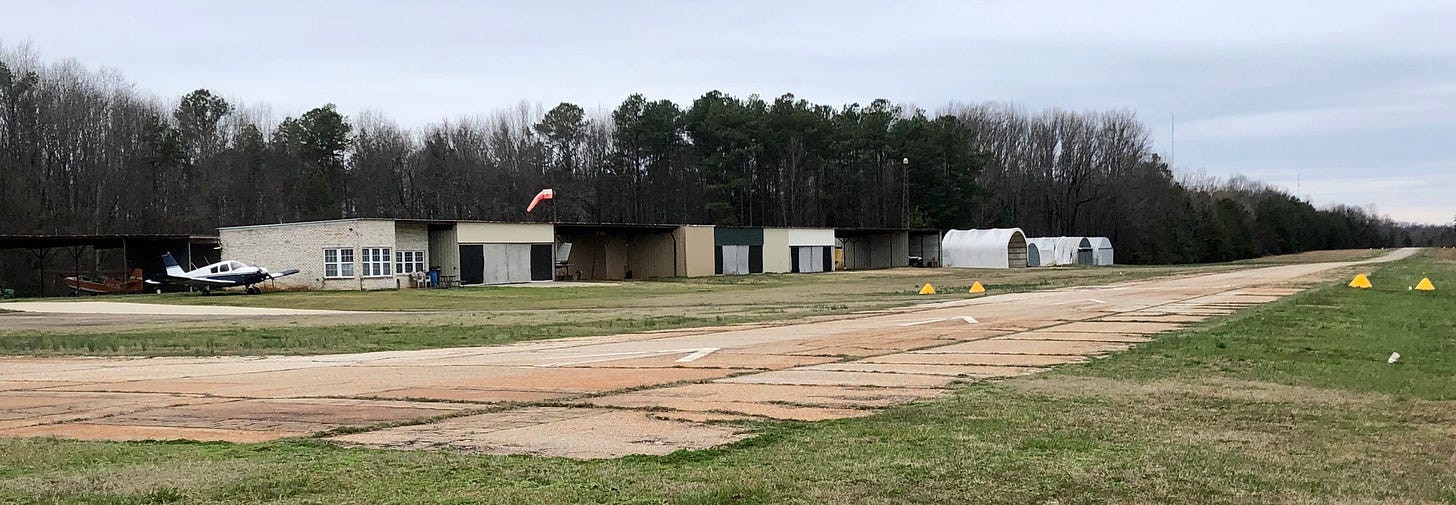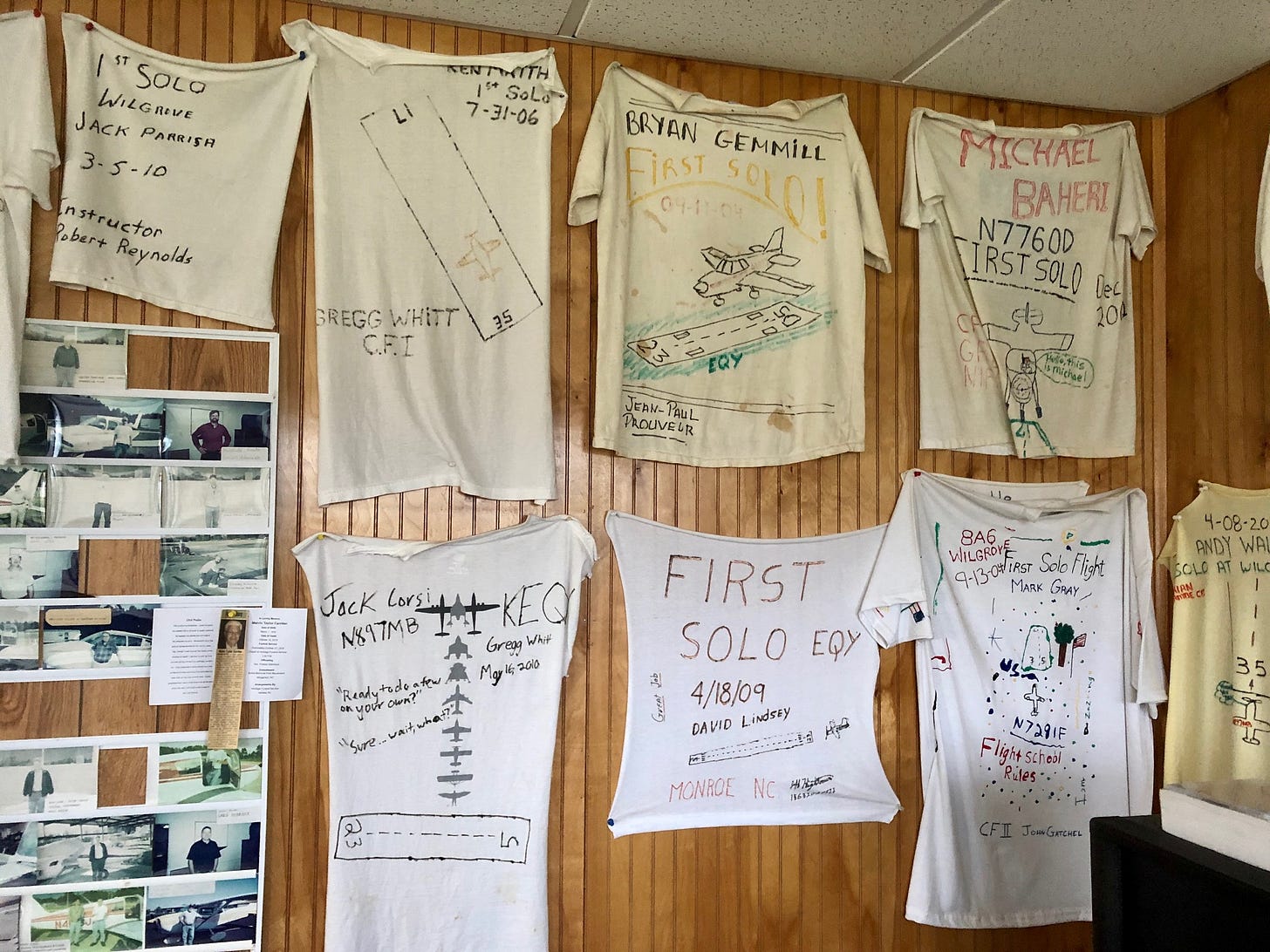Grounded: Charlotte’s ‘2nd-largest airport’ is closing
Plus: Movie theater exec says to expect recliner upgrades; Crosland reportedly in huge Plaza-Midwood land deal; Ally buys subprime credit credit company
Good morning! Today is Friday, February 21, 2020. You’re reading The Charlotte Ledger, an e-newsletter with local business-y news and insights for Charlotte, N.C.
Need to subscribe? Sign up for free here (charlotteledger.substack.com).
Like what you see? Forward to a friend or share on social media.
Today’s Ledger is sponsored by CXN Advisory, a Charlotte-based firm that advises on executive goal-setting and execution for leaders of early stage and high-growth organizations. Subscribe to CXN’s Set The Boat newsletter for regular leadership insights.

East Charlotte airport for private pilots succumbs to development pressures; Memories of solo flights in ‘Little Bird’

Wilgrove Airport, the home of Charlotte’s only flight school and a gathering spot for recreational pilots in east Charlotte, is closing this spring as development in the area takes off.
You might be saying, “Wait, what? There’s an airport in east Charlotte?” And the answer is yes — off Albemarle Road near I-485 — although it is really more like an airstrip with a couple small office buildings, a gas pump and a couple dozen small planes parked in hangars and on the grass.
“I used to tell people we were the second-largest airport in Mecklenburg County,” says airport manager Alan Cobb. “Some of them were smart enough to ask, ‘How many are there?’ Well, two.”
Cobb says the owner of the land decided to sell. “A developer approached them and made them an offer they couldn’t refuse,” he says. “We all knew at some point this property would get too expensive.”
Cobb says he doesn’t know the details. Property records show the 53-acre site is owned by Wilgrove Investments LLC, whose owner did not return a phone call Thursday. It is zoned for single-family residential (mostly R-4).

Wilgrove Airport, off Albemarle Road near I-485 in east Charlotte, has kept a low profile since it opened in the late 1960s.
Red dirt on the eastside: The Albemarle Road corridor near I-485 has seen a lot of development action lately. Just inside I-485, Alliance Residential has 336 luxury apartments under construction at Broadstone Lemmond Farm, which also includes retail and office components. Just outside I-485, Novant Health opened its Mint Hill Medical Center a little more than a year ago. The airport is on Parkton Road, about two miles to the west.
The airport was built in the late 1960s, when this part of town was way out in the country. Pilots described the airfield, which is not entirely flat, as filled with memories. It was a gathering spot where they would hold cookouts and listen to music. It’s where they earned their wings by taking their first solo flights. The airport’s website includes photos of about 200 happy pilots in the last decade who first flew by themselves at Wilgrove — a big milestone in learning to fly. Some went on to become commercial pilots.

T-shirts hanging on the wall inside Wilgrove Airport commemorate the first solo flights of student pilots. (Photos courtesy of Davie Hinshaw)
With a runway that is 2,700 feet, the airport accommodates mostly small planes, and it doesn’t have much business traffic. It averages about 50 takeoffs and landings a day, and about three dozen planes are based there, according to AirNav, a site for pilots.
Under the radar: Pilots say the runway was originally designed for drag racing but became an airport around 1967. Its existence has been mostly low profile, except when expansion plans drew scrutiny from neighbors.
A 1969 Charlotte Observer article quoted a nearby resident telling county commissioners: “I don’t like the idea of student pilots flying over my house.” Another neighbor said: “Don’t take me wrong when I say this, but those planes come within shotgun range.” A 1988 article chronicled objections from neighbors about the noise from twin-engine planes.
Last of the landing strips: Local recreational pilots say there are no other airfields in Mecklenburg County that have public access for small planes. There are a few other landing strips in the county, but they are private. The closest public one is Goose Creek Airport in the Union County town of Indian Trail.
Comments reacting to the news of the closing on the airport’s Facebook page included “Sorry to see it go,” “Still doesn’t seem real” and “So sad!!”
Retired music teacher Bill Hanna, 87, took his first lesson at Wilgrove in 1986. He bought a Cessna 150 that he nicknamed “Little Bird” and flew it until last year, when medical issues prevented him from flying.
Hanna says he relished making the 45-minute flight to meet buddies for lunch at the 57 Alpha Cafe at Rutherfordton’s airport. They ate what they called a “$100 hamburger,” which is how much they figured it cost once they included their planes’ fuel bills.
What’s the appeal of flying? “The earth looks so good from 3,000 feet above,” he says. “It was fun getting into the air.”
Now, though, Hanna’s flying days are finished — and so is the airfield where he learned to fly. “I hate it. It’s painful for a lot of folks out there now.”

Wilgrove Airport is closing in April, its manager says. (Photos courtesy of Davie Hinshaw)
The future of the movie theaters: Food-ordering apps and heated recliners
Studio Movie Grill opened its second theater in Charlotte in December, at Prosperity Village. The Dallas-based company operates 34 theaters in 10 states — and has its eyes on more growth in Charlotte.
The Ledger sat down with chief financial officer Ted Croft to talk about where the future of movie theaters is heading … and why those concessions are so darned expensive. Remarks have been edited for clarity and space:
Q. How is the industry changing? How do you compete with people who have 70” TVs in their living rooms?
Think way back when everybody said, “Cable is going to kill the theaters.” Then it was “The DVR is going to kill the theaters.” Now it’s “Netflix is going to kill the theaters.” It hasn’t happened. There are a lot of producers, talent, directors that say if it’s not on the big screen, they’re not interested.
We have contrarian view to this whole streaming — that it is creating more storytelling. It is creating more talent. It is bringing these millennials out into the theaters. We think it is creating more love of movies, love of storytelling.
A lot of the Netflix and Amazon movies are more made-for-TV. They try to play it on a big screen and you go, “That’s not made for the big screen.” There’s a noticeable quality difference between the big screen and made-for-TV.
Q. What do you have to do to draw people in? I’m sure there’s a focus on the experience. Can you talk about what you do to enhance the experience?
Ten years ago, the expectation was, “Oh, they serve food. It’s going to be cold pizza.”
The expectation has moved up. Now, 70% of all theaters are going to be dine-in. We continue to invest. Our audio-visual is top-of-the-line. That is where we will not skimp. We have upgraded to laser projection and high-quality sound.
Silly enough, the chairs have to get better, too. The chairs went from office chairs to fixed chairs to recliners. Now, you have to have heaters and chilling cup holders. We have chairs we are experimenting with that have the little lights on them. We are trying all kinds of things, because the chair is a big deal.
I don’t know about you, but I lean back, and I fall asleep.
Q. What do movie theaters of the future look like? What is the next big thing?
Probably a little more ordering at your seat. The apps are all improving in our industry. We are close to having that seamless visit. I can get my ticket online. What if I can order my food online? Then I can reorder and I can pay, and maybe there’s no interaction at all, except us bringing your food.
Q. When people go to the movies, it seems as though the food costs are very expensive. You get a 32-ounce drink and it’s $7 when the syrup costs you a quarter. Why is that?
We want to stay competitive. It’s not so much that it’s a captured audience, but we try to price ourselves as causal dining, just a little bit above casual dining. We compare ourselves to some of the mid-range casual dining chains, and we want to be just a tick above. We don’t want to gouge our guests. We want them to come more often.
Some of our traditional competitors, their popcorn and drinks are a lot more than ours are.
Q. Where do you see Charlotte in your future growth?
We are very active in Charlotte. We are looking at 37 locations across the country, so I do confuse them at times. Is there a Toys “R” Us south of Charlotte that closed down?
Q. Pineville?
There are a couple of locations, big box retailers who have exited. We are looking at those strongly. We would like to expand in Charlotte. We would love to see three, four, five units here in the next three to four years.
Today’s supporting sponsors are Cardinal Real Estate Partners…

… and The McIntosh Law Firm/Carolina Revaluation Services:

In brief
Plaza-Midwood land deal: Crosland Southeast has a 12-acre site and three other parcels off Central Avenue under contract in a deal that is expected to close in the next 30 days, Charlotte Agenda reported, citing an unnamed source close to the transaction. “Crosland hasn’t made any decisions about the long-term businesses in the area.” The company is known for developing mixed-use properties including Birkdale Village and Waverly. (Agenda)
Affordable housing: The YWCA is building 104 apartments on its Park Road campus aimed at people making from 30%-60% of the area’s median income. In a news release announcing the plans, Charlotte planning director Taiwo Jaiyeoba said: “We should all be as focused on increasing affordable housing options and improving inequities.” (WFAE)
Discrimination settlement: Time Warner Cable is paying $745,000 in back wages to settle charges of hiring discrimination brought by nearly 3,000 people in Charlotte and other cities in the Carolinas. “Time Warner facilities in Charlotte and Morrisville in North Carolina and West Columbia in South Carolina discriminated against African Americans and women applying for sales jobs,” the Labor Department alleged. The company admitted no wrongdoing. It has since changed its name to Spectrum. (Observer)
Headquarters relocation: SPX Corp. is moving its corporate HQ from Ballantyne to Waverly. The company is taking two floors at The Nexus office building on Ardrey Kell Road. (Biz Journal, subscriber-only)
Vaping ban: Duke University, which was founded with tobacco money, plans to go smoke-free on campus starting July 1 — including a ban on e-cigarettes and vaping products. Health officials continue to “grapple with mysterious vaping-related lung injuries and deaths.” (NC Health News)
Ally purchase: Ally Financial announced a deal to buy CardWorks, a New York-based subprime credit card and consumer finance lender. Ally is paying $2.65B in cash and stock. CardWorks “specializes in unsecured servicing and merchant services, though it also offers recreational and marine consumer finance loans.” (American Banker)
Massive snowstorm cripples Charlotte, forces CMS to cancel classes

Food and drink news
A weekly wrap-up of the week’s eating and drinking developments
Dairy Queen on the move: The operator of the old Dairy Queen in Plaza-Midwood has signed a lease for a new Dairy Queen at Eastway Crossing shopping center. (Agenda)
Just in time for Mardi Gras: Kathleen Purvis profiles Cajun Queen in Elizabeth. It opened in 1985 “in the middle of the craze for Paul Prudhomme’s blackened redfish, when it seemed like the whole country was going to choke on clouds of peppery smoke.” (CharlotteFive)
New cocktail bar: Billy Sunday opens Monday at Optimist Hall. It will offer classic drinks, draft cocktails and “a selection of cocktails made with vintage amari.” In addition, “guests can also order a ‘choose your own adventure’ bartender’s choice.” (Unpretentious Palate, subscription-only)
Need to sign up for this e-newsletter? Here you go:
Got a news tip? Think we missed something? Drop me a line at editor@cltledger.com and let me know.
Like what we are doing? Feel free to forward this along and to tell a friend.
Searchable archives available at https://charlotteledger.substack.com/archive.
On Twitter: @cltledger
Sponsorship information: email editor@cltledger.com
The Charlotte Ledger is an e-newsletter and web site publishing timely, informative, and interesting local business news and analysis Mondays, Wednesdays, and Fridays, except holidays and as noted. We strive for fairness and accuracy and will correct all known errors. The content reflects the independent editorial judgment of The Charlotte Ledger. Any advertising, paid marketing, or sponsored content will be clearly labeled.
The Charlotte Ledger is published by Tony Mecia, an award-winning former Charlotte Observer business reporter and editor. He lives in Charlotte with his wife and three children.



